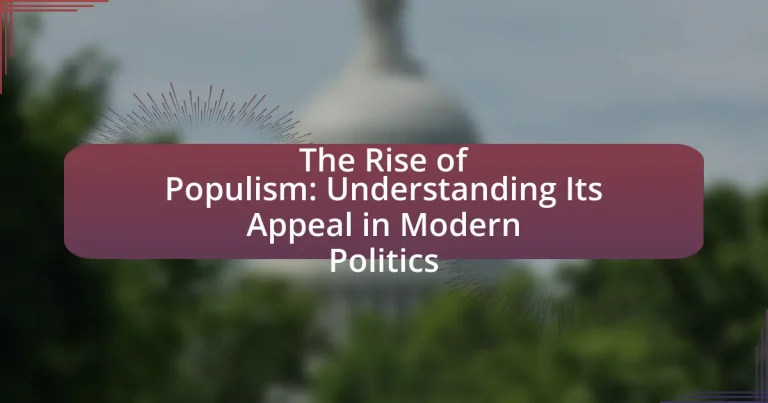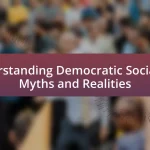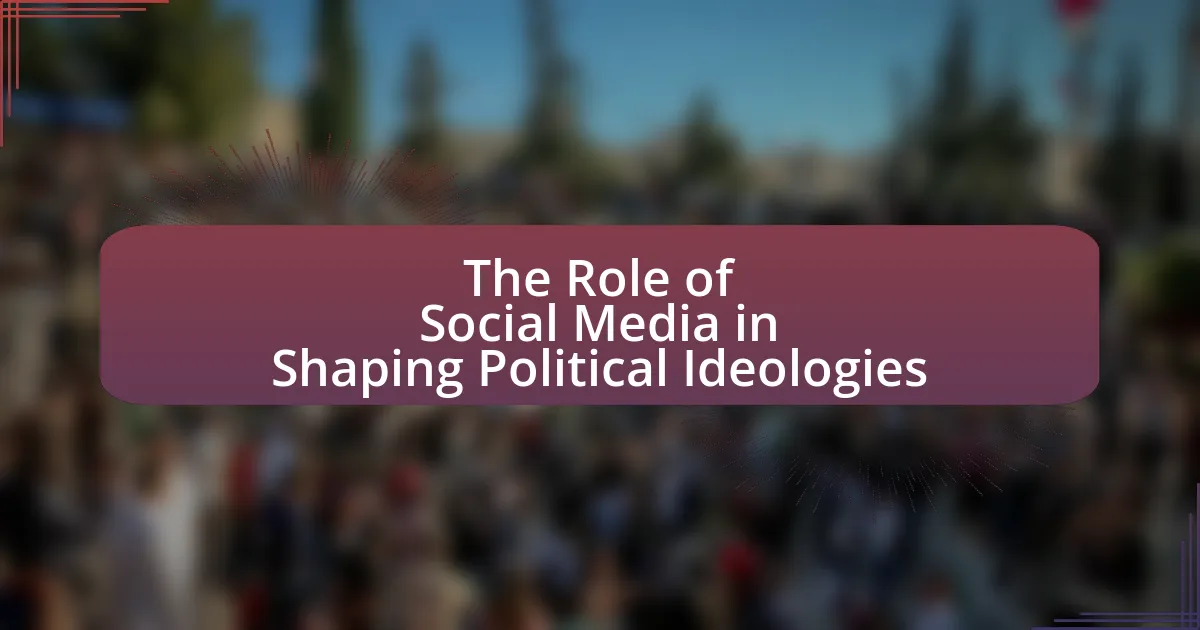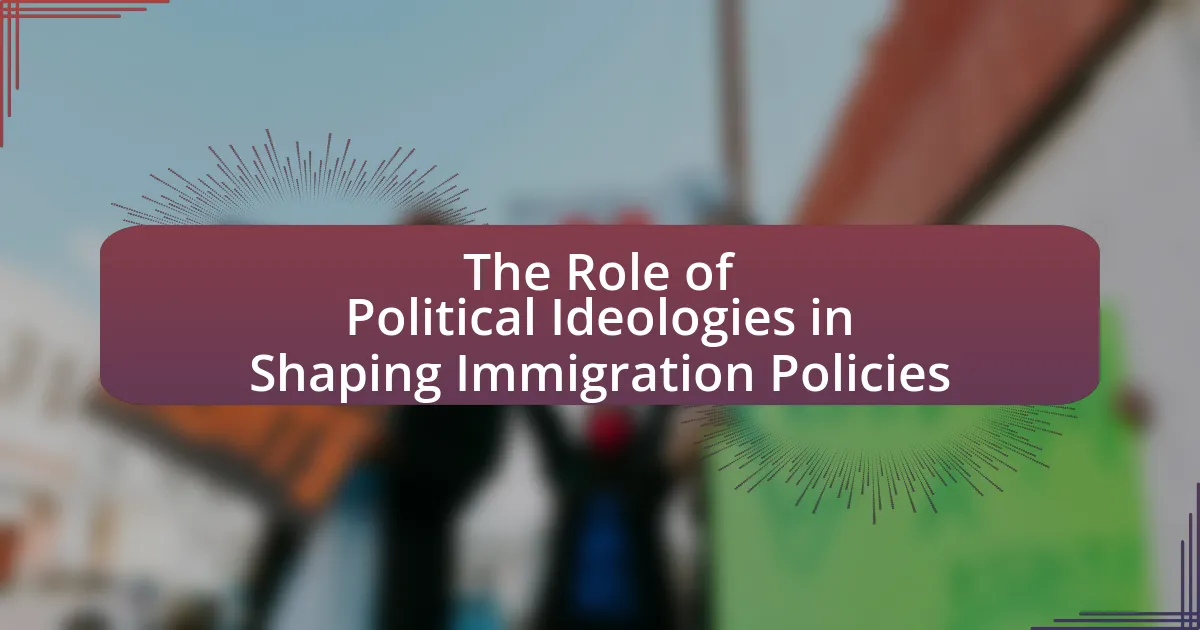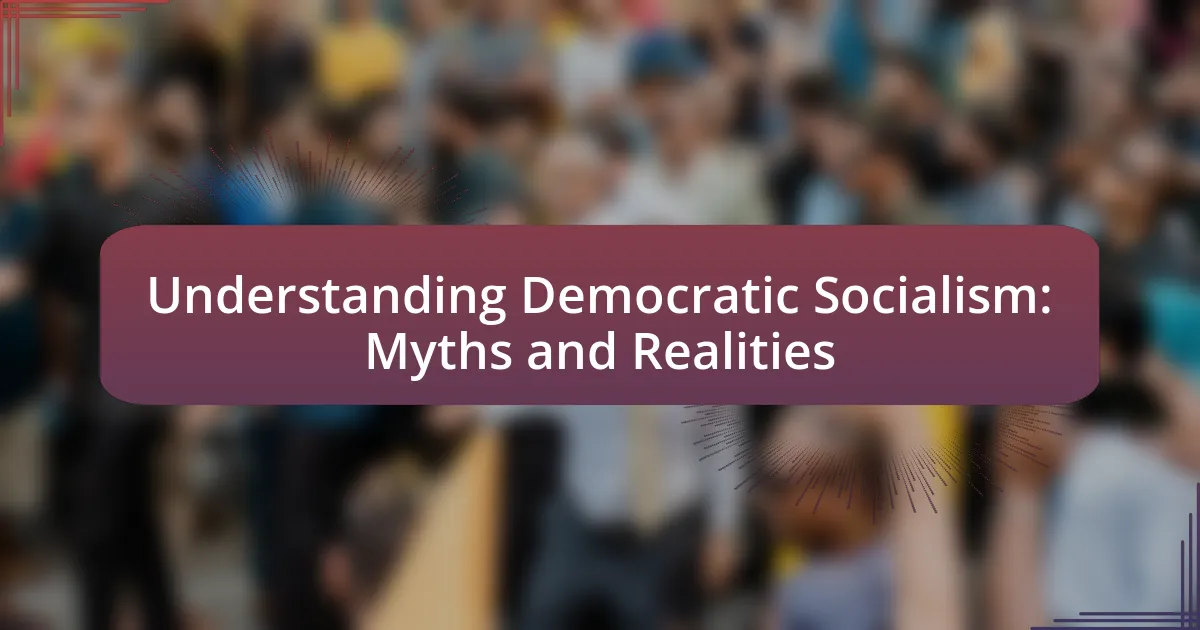Populism is a political approach that seeks to represent the interests of ordinary people against a perceived elite, gaining traction in modern politics due to factors like economic inequality, political disenfranchisement, and distrust in traditional institutions. The article explores the definition of populism, its key characteristics, and historical factors contributing to its rise, including economic crises and cultural backlash. It also examines the impact of social media on populist movements, the psychological appeal of populist leaders, and the consequences of populism for democracy and civil liberties. Additionally, the article discusses strategies to address the rise of populism, including enhancing economic equity, promoting civic engagement, and strengthening democratic institutions.
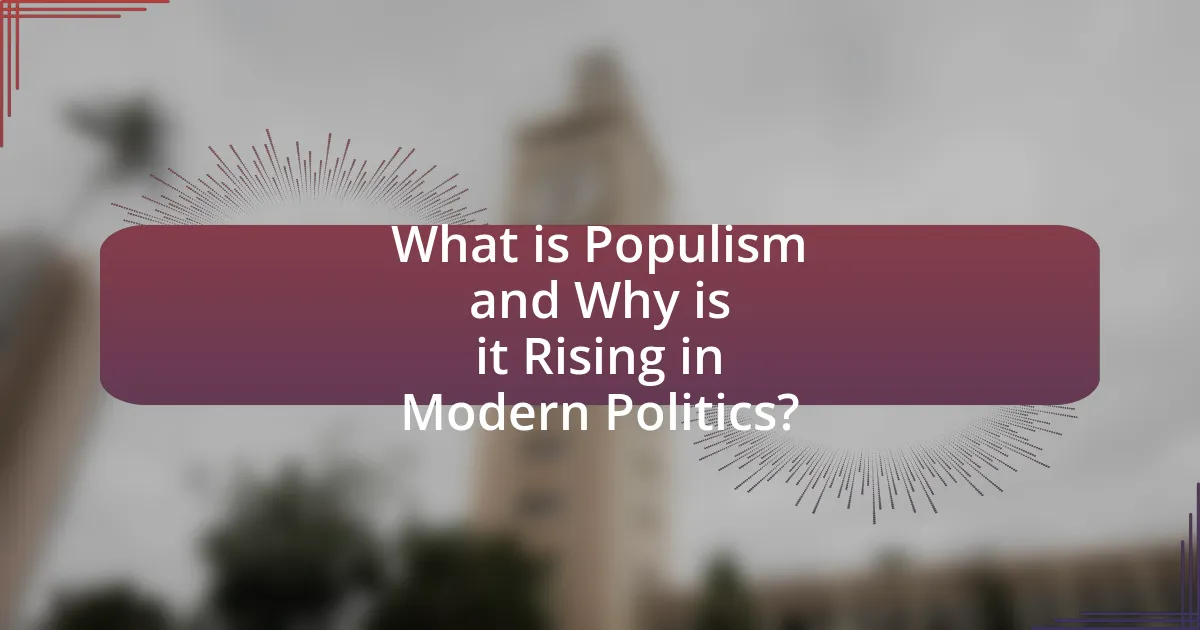
What is Populism and Why is it Rising in Modern Politics?
Populism is a political approach that seeks to represent the interests of ordinary people, often contrasting them against a perceived elite or establishment. Its rise in modern politics can be attributed to factors such as economic inequality, political disenfranchisement, and a growing distrust of traditional political institutions. For instance, the 2008 financial crisis exacerbated economic disparities, leading to increased support for populist leaders who promise to challenge the status quo. Additionally, the proliferation of social media has enabled populist movements to mobilize support rapidly, as seen in the campaigns of figures like Donald Trump in the United States and Jair Bolsonaro in Brazil. These leaders often utilize rhetoric that resonates with the frustrations of the populace, further fueling the rise of populism in contemporary political landscapes.
How do we define populism in a political context?
Populism in a political context is defined as a political approach that seeks to represent the interests and concerns of the “common people” against the elite or establishment. This definition is supported by the observation that populist movements often emerge during periods of social or economic discontent, where leaders claim to voice the grievances of the masses. Historical examples include the rise of leaders like Hugo Chávez in Venezuela and Donald Trump in the United States, both of whom positioned themselves as champions of the ordinary citizen against perceived corrupt elites.
What are the key characteristics of populist movements?
Populist movements are characterized by their appeal to the common people against the elite, emphasizing a dichotomy between “the people” and “the elite.” These movements often utilize charismatic leadership, mobilizing emotions and grievances to create a sense of urgency and collective identity among supporters. Additionally, populist movements typically advocate for direct democracy and often reject established political institutions, claiming they are corrupt or unresponsive to the needs of the populace. Historical examples include the rise of leaders like Hugo Chávez in Venezuela and Donald Trump in the United States, both of whom capitalized on widespread discontent with traditional political structures to galvanize support.
How does populism differ from other political ideologies?
Populism differs from other political ideologies by emphasizing the dichotomy between “the people” and “the elite,” positioning itself as a movement that claims to represent the common citizen against a corrupt establishment. Unlike traditional ideologies such as liberalism or conservatism, which often focus on specific policy frameworks or philosophical principles, populism is more about mobilizing popular sentiment and addressing perceived grievances. For instance, populist leaders often utilize rhetoric that simplifies complex political issues into a battle of good versus evil, appealing directly to emotions and national identity. This approach has been evident in various global movements, such as the rise of leaders like Donald Trump in the United States and Jair Bolsonaro in Brazil, who have successfully harnessed populist sentiments to gain political power.
What historical factors have contributed to the rise of populism?
The rise of populism has been significantly influenced by historical factors such as economic inequality, political disenfranchisement, and cultural backlash. Economic inequality, particularly during periods of financial crises, has led to widespread discontent among the lower and middle classes, prompting them to seek leaders who promise to address their grievances. For instance, the Great Depression in the 1930s saw the emergence of populist movements as people sought alternatives to traditional political parties that failed to alleviate their suffering.
Political disenfranchisement has also played a crucial role; when large segments of the population feel excluded from the political process, they are more likely to support populist leaders who claim to represent the “common people.” The rise of authoritarian populism in the late 20th and early 21st centuries can be traced back to the perceived failures of established political institutions to respond to citizens’ needs.
Cultural backlash against globalization and immigration has further fueled populist sentiments. As societies have become more diverse, some groups have reacted by embracing populist ideologies that promise to restore national identity and sovereignty. The Brexit vote in 2016 exemplifies this trend, where a significant portion of the electorate supported leaving the European Union in response to concerns over immigration and loss of national control.
These historical factors collectively illustrate how economic, political, and cultural dynamics have contributed to the rise of populism across various contexts.
How have economic crises influenced populist sentiments?
Economic crises have significantly amplified populist sentiments by creating widespread discontent and distrust in established political institutions. During economic downturns, such as the 2008 financial crisis, unemployment rates soared, and many individuals experienced financial instability, leading to a perception that traditional political elites failed to address their needs. This environment fosters a fertile ground for populist leaders who promise to represent the “common people” against the perceived corruption and ineffectiveness of the elite. For instance, in the aftermath of the 2008 crisis, populist movements gained traction in various countries, with leaders like Donald Trump in the United States and Marine Le Pen in France capitalizing on economic grievances to rally support.
What role does social media play in the spread of populism?
Social media significantly amplifies the spread of populism by providing a platform for direct communication between populist leaders and their supporters. This medium allows populist figures to bypass traditional media gatekeepers, enabling them to disseminate their messages rapidly and widely. For instance, during the 2016 U.S. presidential election, Donald Trump utilized Twitter to engage with voters, shaping public discourse and mobilizing support. Research indicates that social media facilitates echo chambers, where users are exposed primarily to viewpoints that reinforce their beliefs, further entrenching populist sentiments. A study by the Pew Research Center found that 62% of Americans get news from social media, highlighting its role in shaping political opinions and fostering populist narratives.
Why do people feel drawn to populist leaders?
People feel drawn to populist leaders because these leaders often present themselves as champions of the common people against a perceived corrupt elite. This appeal is rooted in the leaders’ ability to articulate the frustrations and grievances of the populace, particularly during times of economic uncertainty or social change. For instance, research by Cas Mudde and Cristóbal Rovira Kaltwasser highlights that populism thrives in contexts where traditional political parties fail to address the needs of citizens, leading to a demand for alternative voices. Additionally, populist leaders frequently utilize charismatic communication styles and simple messaging that resonate emotionally with their supporters, further solidifying their appeal.
What psychological factors contribute to the appeal of populism?
The psychological factors contributing to the appeal of populism include a sense of identity, perceived disenfranchisement, and the desire for simplicity in complex political landscapes. Individuals often seek belonging and validation, which populist movements provide by emphasizing a shared identity against perceived elites. Research indicates that feelings of alienation and loss of control in society can lead individuals to support populist leaders who promise to restore power to the “common people.” Additionally, populism simplifies complex issues into clear narratives, making it easier for individuals to understand and engage with political discourse. Studies, such as those by Mudde and Kaltwasser, highlight how these psychological needs drive support for populist ideologies across various demographics.
How do populist leaders connect with their supporters?
Populist leaders connect with their supporters by appealing to their emotions and presenting themselves as champions of the common people against the elite. They often utilize direct communication methods, such as social media, to bypass traditional media channels and engage with their audience in a more personal manner. For instance, leaders like Donald Trump and Jair Bolsonaro have effectively used platforms like Twitter and Facebook to share their messages directly, fostering a sense of community and belonging among their followers. This strategy is supported by research indicating that populist rhetoric resonates with individuals who feel marginalized or disillusioned by the political establishment, as it validates their grievances and offers simple solutions to complex problems.
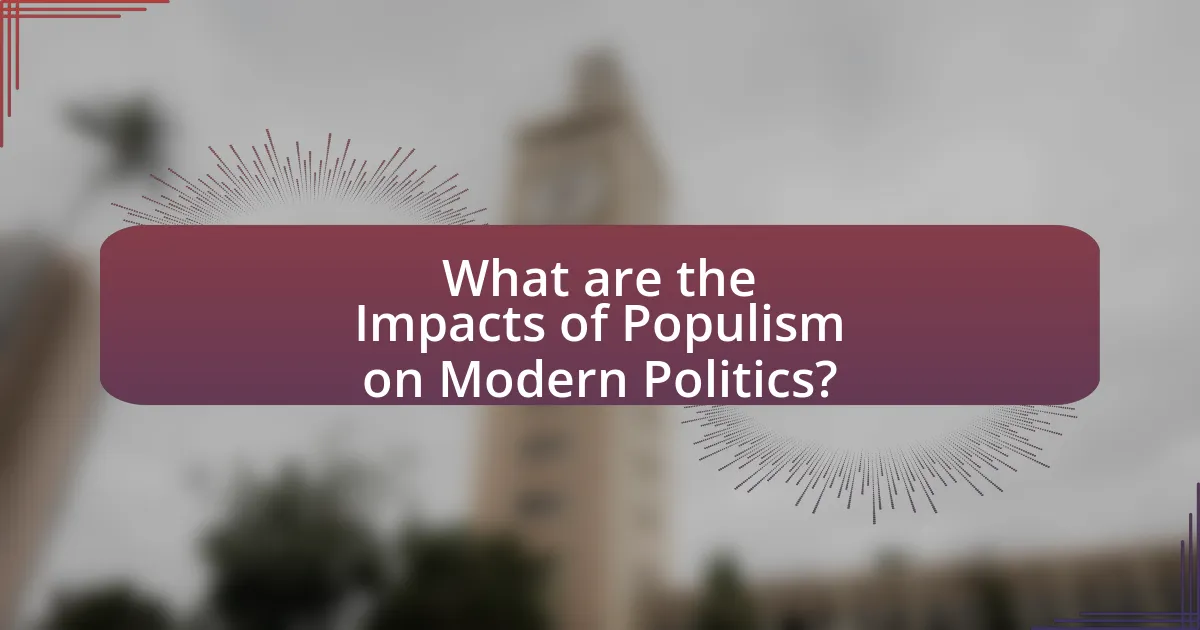
What are the Impacts of Populism on Modern Politics?
Populism significantly impacts modern politics by reshaping political discourse, altering party dynamics, and influencing voter behavior. It often leads to the polarization of political landscapes, as populist leaders typically position themselves against established elites, claiming to represent the “common people.” For instance, the rise of populist movements in Europe and the United States has resulted in the fragmentation of traditional political parties, as seen with the success of parties like the National Front in France and the Tea Party in the U.S. These movements often capitalize on economic discontent and cultural anxieties, which can lead to shifts in policy priorities, such as increased nationalism and skepticism towards globalization. Additionally, populism can undermine democratic institutions by challenging the legitimacy of political opponents and the media, as evidenced by the rhetoric used by populist leaders who frequently label dissenting voices as “fake news.”
How does populism affect traditional political parties?
Populism significantly undermines traditional political parties by challenging their established ideologies and voter bases. This phenomenon often leads to the fragmentation of party systems, as populist movements attract disillusioned voters who feel neglected by mainstream parties. For instance, in countries like Italy and Hungary, populist parties have gained substantial electoral support, resulting in traditional parties losing influence and adapting their platforms to counter populist narratives. This shift can be observed in the rise of parties such as the Five Star Movement in Italy, which capitalized on public dissatisfaction with conventional political elites, thereby reshaping the political landscape.
What challenges do established parties face from populist movements?
Established parties face significant challenges from populist movements, primarily due to their ability to mobilize discontent and present themselves as alternatives to the political status quo. Populist movements often capitalize on public dissatisfaction with traditional parties, portraying them as out of touch with the needs of ordinary citizens. This dynamic can lead to a decline in voter loyalty for established parties, as evidenced by the rise of populist leaders in various countries, such as Donald Trump in the United States and Jair Bolsonaro in Brazil, who successfully tapped into widespread frustrations regarding economic inequality and political corruption. Furthermore, populist movements frequently employ direct communication strategies, utilizing social media to engage with voters and bypass traditional media channels, which can diminish the influence of established parties in shaping public discourse.
How do populist parties reshape political discourse?
Populist parties reshape political discourse by prioritizing the voice of the “common people” over established elites, often framing political issues in a binary manner that simplifies complex societal problems. This approach encourages emotional engagement and mobilizes support by appealing to widespread grievances, such as economic inequality or cultural dislocation. For instance, the rise of parties like the National Front in France and the Five Star Movement in Italy illustrates how populists utilize rhetoric that challenges traditional political norms, thereby altering the language and themes prevalent in mainstream political discussions. Their success in elections often leads to a shift in the political agenda, forcing established parties to address issues that were previously marginalized, as seen in the increased focus on immigration and national sovereignty in various European elections.
What are the potential consequences of populism for democracy?
Populism can undermine democracy by eroding institutional checks and balances. This occurs as populist leaders often concentrate power, bypassing traditional democratic processes and diminishing the role of independent institutions. For instance, in Hungary, Prime Minister Viktor Orbán’s government has systematically weakened the judiciary and media, leading to a decline in democratic norms, as reported by the Freedom House in its 2021 report, which classified Hungary as a “hybrid regime.” Additionally, populism can polarize societies, creating an “us versus them” mentality that fosters division and hostility, as seen in the United States during the Trump administration, where political discourse became increasingly antagonistic. These consequences highlight the risks populism poses to the stability and functionality of democratic systems.
How can populism lead to democratic backsliding?
Populism can lead to democratic backsliding by undermining institutional checks and balances. Populist leaders often concentrate power by attacking judicial independence, limiting media freedom, and eroding civil liberties, which weakens democratic norms. For instance, in Hungary, Prime Minister Viktor Orbán’s government has systematically dismantled democratic institutions since 2010, consolidating power and reducing the effectiveness of opposition parties. This pattern demonstrates how populism can create an environment where democratic practices are compromised, leading to authoritarian governance.
What are the implications of populism for civil liberties?
Populism often leads to the erosion of civil liberties as populist leaders prioritize the will of the majority over individual rights. This trend can manifest in the suppression of dissent, restrictions on freedom of speech, and the undermining of judicial independence. For instance, in countries like Hungary and Turkey, populist governments have enacted laws that limit media freedom and target opposition voices, demonstrating a clear pattern where populism compromises the protection of civil liberties in favor of consolidating power.
How does populism influence policy-making?
Populism influences policy-making by prioritizing the demands and concerns of the general populace over established political norms and elite interests. This shift often leads to the implementation of policies that resonate with popular sentiment, such as anti-immigration measures, economic protectionism, and social welfare programs aimed at the working class. For instance, in countries like Hungary and Brazil, populist leaders have enacted significant changes in immigration policy and economic reforms that reflect the desires of their voter base, often bypassing traditional legislative processes. This approach can result in rapid policy changes that may not align with expert recommendations or long-term planning, as seen in the populist responses to economic crises that prioritize immediate relief over sustainable solutions.
What types of policies are typically promoted by populist leaders?
Populist leaders typically promote policies that emphasize nationalism, economic protectionism, and anti-establishment sentiments. Nationalism manifests in policies that prioritize the interests of the native population, often through immigration restrictions and trade barriers. Economic protectionism is evident in advocating for local industries and jobs, frequently through tariffs and subsidies. Anti-establishment sentiments are reflected in calls for political reforms that challenge the status quo, such as reducing the influence of elites and increasing direct democracy. These policy types resonate with voters who feel marginalized by globalization and traditional political structures, as seen in various populist movements worldwide, including the rise of leaders like Donald Trump in the United States and Jair Bolsonaro in Brazil.
How do populist policies impact economic and social outcomes?
Populist policies often lead to significant economic and social outcomes by prioritizing the needs of the “common people” over established elites. These policies can result in short-term economic boosts through increased government spending and social welfare programs, which may reduce inequality and improve living standards for certain demographics. For instance, in countries like Venezuela, populist policies initially led to increased access to healthcare and education, but ultimately resulted in economic instability and hyperinflation due to mismanagement and over-reliance on oil revenues.
Socially, populist policies can foster a sense of community and belonging among supporters, but they can also exacerbate divisions within society by vilifying perceived elites and outsiders. Research by Cas Mudde and Cristóbal Rovira Kaltwasser in “Populism: A Very Short Introduction” highlights that while populism can mobilize disenfranchised groups, it may also lead to increased polarization and conflict within society. Thus, the impact of populist policies is complex, yielding both immediate benefits and long-term challenges.
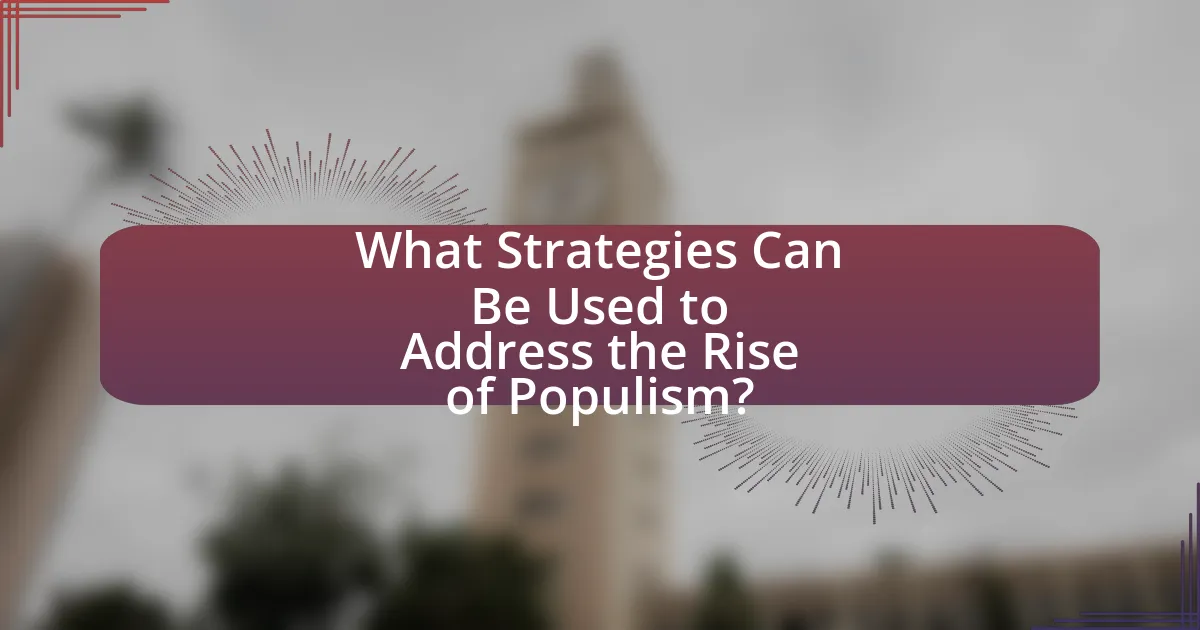
What Strategies Can Be Used to Address the Rise of Populism?
To address the rise of populism, strategies such as promoting inclusive political dialogue, enhancing economic equity, and strengthening democratic institutions can be employed. Inclusive political dialogue involves engaging diverse voices in policymaking to counteract the alienation felt by certain groups, which is often exploited by populist leaders. Enhancing economic equity can be achieved through policies that reduce income inequality and provide social safety nets, as economic disenfranchisement is a significant driver of populist sentiment. Strengthening democratic institutions, including independent media and judiciary, ensures accountability and transparency, which can mitigate the appeal of populist rhetoric that often thrives on distrust in established systems. These strategies are supported by research indicating that addressing the root causes of populism, such as economic disparity and political disenfranchisement, can effectively reduce its influence in modern politics.
How can traditional political parties respond to populism?
Traditional political parties can respond to populism by adopting more inclusive and responsive policies that address the concerns of disaffected voters. This approach involves actively engaging with the electorate to understand their grievances, such as economic inequality and political disenfranchisement. For instance, research indicates that parties that incorporate populist themes into their platforms, while maintaining their core values, can effectively counter the appeal of populist movements. A study by the European Parliament found that parties that prioritize social justice and economic reforms can regain voter trust and diminish the influence of populist rhetoric.
What strategies can parties adopt to regain voter trust?
Parties can regain voter trust by increasing transparency and accountability in their operations. Implementing regular public disclosures about decision-making processes and financial expenditures can help build credibility. For instance, a study by the Pew Research Center in 2020 found that 70% of voters prioritize transparency in government, indicating that when parties openly share information, they are more likely to foster trust among constituents. Additionally, engaging in active dialogue with voters through town hall meetings and social media platforms allows parties to address concerns directly, demonstrating responsiveness and commitment to the electorate’s needs.
How can parties effectively communicate their policies to counter populism?
Parties can effectively communicate their policies to counter populism by emphasizing transparency, engaging directly with constituents, and utilizing data-driven messaging. Transparency builds trust, as seen in studies showing that voters respond positively to clear and honest communication about policy intentions. Engaging directly with constituents through town halls and social media allows parties to address concerns and counter misinformation, which is crucial in an era where populist rhetoric often thrives on fear and division. Data-driven messaging, supported by research from the Pew Research Center, indicates that voters are more likely to support policies when they understand the evidence and rationale behind them, thus reducing the appeal of populist narratives that oversimplify complex issues.
What role does education play in mitigating populist appeal?
Education plays a crucial role in mitigating populist appeal by fostering critical thinking and informed citizenship. Higher levels of education correlate with increased skepticism towards populist rhetoric, as educated individuals are more likely to analyze political claims and seek evidence-based information. Studies, such as those conducted by the Pew Research Center, indicate that individuals with a college degree are less susceptible to populist narratives that exploit fears and misinformation. Furthermore, education promotes social cohesion and understanding of diverse perspectives, which counters the divisive nature of populist movements.
How can civic education promote critical thinking among voters?
Civic education promotes critical thinking among voters by equipping them with the knowledge and skills necessary to analyze political information and engage in informed decision-making. This educational approach encourages individuals to question sources, evaluate arguments, and understand the implications of policies, which are essential skills in a democratic society. Research indicates that civic education programs, such as those implemented in various U.S. states, have led to increased civic engagement and improved critical thinking skills among participants, demonstrating the effectiveness of structured educational initiatives in fostering a more informed electorate.
What initiatives can be implemented to foster political engagement?
To foster political engagement, initiatives such as civic education programs, community forums, and digital platforms for dialogue can be implemented. Civic education programs in schools and communities enhance understanding of political processes and encourage active participation, as evidenced by studies showing that informed citizens are more likely to vote and engage in civic activities. Community forums provide spaces for discussion and debate, allowing individuals to voice concerns and connect with local representatives, which has been shown to increase trust in government and civic participation. Additionally, digital platforms facilitate broader access to political information and enable grassroots organizing, as seen in movements that successfully mobilized voters through social media campaigns.
What best practices can be adopted to strengthen democratic institutions?
To strengthen democratic institutions, best practices include enhancing transparency, promoting civic engagement, and ensuring judicial independence. Transparency in government operations fosters accountability, as evidenced by studies showing that open data initiatives can reduce corruption and increase public trust. Promoting civic engagement through education and outreach encourages active participation in the democratic process, which has been linked to stronger governance and more responsive institutions. Ensuring judicial independence protects the rule of law and prevents political interference, a principle supported by international frameworks such as the United Nations’ Basic Principles on the Independence of the Judiciary. These practices collectively contribute to the resilience and effectiveness of democratic institutions in the face of populist challenges.
How can transparency and accountability be enhanced in governance?
Transparency and accountability in governance can be enhanced through the implementation of open data initiatives and robust regulatory frameworks. Open data initiatives allow citizens to access government information, fostering an environment of trust and enabling public scrutiny. For instance, the U.S. government’s Data.gov platform provides access to a vast array of government data, promoting transparency. Additionally, regulatory frameworks that mandate regular audits and public reporting can hold officials accountable for their actions. The World Bank has noted that countries with strong accountability mechanisms experience lower levels of corruption, demonstrating the effectiveness of these measures in enhancing governance.
What measures can be taken to protect civil liberties in a populist era?
To protect civil liberties in a populist era, it is essential to implement robust legal frameworks that safeguard individual rights against potential government overreach. Establishing independent judicial systems can ensure that laws protecting civil liberties are upheld, as seen in countries with strong rule of law, such as Canada, where the Charter of Rights and Freedoms provides a clear legal basis for protecting individual rights. Additionally, promoting civic education can empower citizens to understand and advocate for their rights, as evidenced by initiatives in Scandinavian countries that have led to higher public awareness of civil liberties. Furthermore, fostering a vibrant civil society through support for non-governmental organizations can create a counterbalance to populist movements, as demonstrated by the role of civil society in defending democratic norms in Poland during its recent political challenges.
